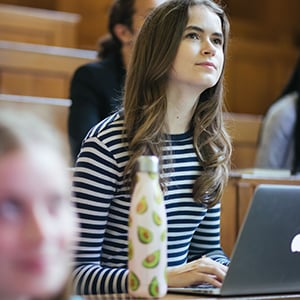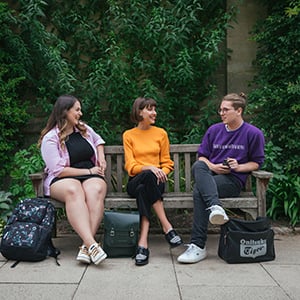
Human Sciences
Course overview
UCAS code: BCL0
Entrance requirements: AAA
Course duration: 3 years (BA)
Subject requirements
Required subjects: Not applicable
Recommended subjects: Not applicable
Helpful subjects: Biology, Maths
Other course requirements
Admissions tests: TSA (Section 1)
Written Work: None
Admissions statistics*
Interviewed: 52%
Successful: 15%
Intake: 29
*3-year average 2022-24
Contact
Tel: +44 (0) 1865 274702
Email: admissions@ihs.ox.ac.uk
Unistats information for this course can be found at the bottom of the page
Please note that there may be no data available if the number of course participants is very small.
About the course
Human Sciences is an interdisciplinary degree course which enables students to study humans from multiple interconnecting perspectives across the biological and social sciences.
The degree allows students to make connections between biological, social and cultural phenomena. Such connections are essential for addressing the major issues we face in a rapidly changing world. The programme offers an exciting and challenging alternative to more traditional undergraduate courses.
The BA in Human Sciences was founded in 1969 by specialists across a range of departments at the University. They recognised the need for an interdisciplinary understanding of fundamental issues and problems confronting human societies. This need is as critical now as it was then, as is reflected in the global intensification of interdisciplinary research across traditional subject boundaries in the decades since the degree began.
Central topics include:
- the evolution of humans and their behaviour
- molecular and population genetics
- population growth and ageing
- ethnic and cultural diversity
- and human interaction with the environment, including conservation, disease, and nutrition.
Within a framework of human diversity and sustainability, Human Scientists study the connections between human biology, evolution, genetics, development, psychology, behaviour, ecology, demography, society and culture. This helps them to develop professional competences suited to addressing multidimensional human problems.
The course is taught by specialists from across the University. Lectures introduce the material and provide the core concepts and theories for each paper. Tutorials allow students to consider particular topics in greater depth and draw connections across different perspectives and parts of the degree. They also allow students from different academic backgrounds to gain the necessary grounding across a range of competencies.
Option courses and dissertation preparation in the final year enable students to deepen their interdisciplinary training and expertise in particular topics of interest.
 |  |  |
'In my first term alone I have studied human geography, anthropology, maths, physiology, genetics and evolution! That’s what I love about Human Sciences – it covers so many different areas and subjects. It’s interesting to develop an understanding of humans as both social and biological creatures by seeing how everything fits together.' Maija-Eliina | 'Human Sciences is the perfect course for ever-curious, ‘all-rounders’ who refuse to be pigeonholed into arts vs sciences. Being exposed to such a wide range of subjects, viewpoints, and approaches fosters a diverse skill set invaluable for any future career.' Jessamy | 'Frequently friends on other courses, watching with envy as I studied such diverse and interesting subjects, said to me: "if I had known about Human Sciences earlier, I would have applied for that instead.' Clare |
Unistats information
Discover Uni course data provides applicants with Unistats statistics about undergraduate life at Oxford for a particular undergraduate course.
Please select 'see course data' to view the full Unistats data for Human Sciences.
Please note that there may be no data available if the number of course participants is very small.
Visit the Studying at Oxford section of this page for a more general insight into what studying here is likely to be like.
Human Sciences
A typical week
During Years 1 and 2 your work will be divided between lectures (about ten a week) and tutorials (one or two a week with more in the first year). In addition, some practical experience in genetics, physiology, demography or statistics will be offered in certain terms. Computers are used in the teaching of quantitative methods.
In the third year the tutorial and class requirement is reduced to allow more time for option papers and research for your dissertation.
Tutorials are usually 2-4 students and a tutor. Class sizes may vary depending on the options you choose. There would usually be no more than around 20 students although the more popular classes may include up to 30 students.
Most tutorials, classes, and lectures are delivered by staff who are tutors in their subject. Many are world-leading experts with years of experience in teaching and research. Some teaching may also be delivered by postgraduate students who are usually studying at doctoral level.
To find out more about how our teaching year is structured, visit our Academic Year page.
Year 1
Courses | Assessment |
|---|---|
Five compulsory courses are taken:
| First University examinations: five written papers; satisfactory practical record |
Year 2
Courses | Assessment |
|---|---|
Five courses are taken:
| The Human Ecology course is assessed by an extended essay written in the final term of the second year and a presentation given in the first term of Year 3. |
Year 3
Courses | Assessment |
|---|---|
| Final University examinations: currently six written papers and a dissertation; extended essay and presentation (see under Year 2) |
The options listed above are illustrative and may change. More information about current options is available on the Human Sciences website.
The content and format of this course may change in some circumstances. Read further information about potential course changes.
Academic requirements
Qualification | Requirement |
|---|---|
A-levels: | AAA |
Advanced Highers: | AA/AAB |
International Baccalaureate (IB): | 38 (including core points) with 666 at HL |
Any other equivalent qualification: | View information on other UK qualifications, and international qualifications. |
Wherever possible, your grades are considered in the context in which they have been achieved.
Read further information on how we use contextual data.
Subject requirements
Helpful: | Biology or Mathematics to A-level, Advanced Higher, Higher Level in the IB or any other equivalent can be helpful to students in completing this course, although they are not required for admission. |
|---|
If a practical component forms part of any of your science A‐levels used to meet your offer, we expect you to pass it.
If English is not your first language you may also need to meet our English language requirements.
Applying
All candidates must follow the application procedure as shown on our Applying to Oxford pages.
The following information gives specific details for students applying for this course.
Admissions test
Test: | TSA (Section 1) |
|---|---|
Test date: | 21, 22, 23, 24 & 27 October 2025 |
Registration window: | To be confirmed |
All candidates must take the Thinking Skills Assessment (TSA) as part of their application.
All the information you need to arrange to take your test as well as how best to prepare can be found on your test page.
Written work
You do not need to submit any written work when you apply for this course.
What are tutors looking for?
The attributes tutors are looking for in applicants include:
- keenness
- an ability to understand things in context and make connections
- readiness to modify ideas in the light of evidence
- the capacity to form and express a personal point of view.
At interview, tutors will not expect you to have any specific prior knowledge of the subject. You will be asked questions designed to help you demonstrate the above attributes.
Visit the Human Sciences website for more detail on the selection criteria for this course.
Careers
Recent graduates have found opportunities in fields including:
- public health
- medicine
- conservation
- the Civil Service
- social policy
- the charity sector
- teaching
- the media
- the law
- industry.
Alison currently works as the Principal Scientist in HIV epidemiology within Public Health England. She says:
‘My undergraduate degree in Human Sciences was excellent preparation for my career. The field of HIV is multifaceted which means we not only measure the prevalence and incidence of HIV but also seek to understand the complexities of sexual behaviour and the political and social context of HIV. Human Sciences gave me a solid grounding in statistical methods, biological and social sciences. Specifically, the cross-disciplinary ethos of the course taught me the importance of collaboration with academics and Human Sciences advocates with a wide range of expertise and the need to interpret data within a social, human context.’
Graduate Vanessa produced the series Frozen Planet. She has worked as a producer/director on a variety of wildlife series including Wildlife on One, The Natural World, Life of Mammals and Planet Earth. She also co-wrote the book accompanying Frozen Planet and has contributed to a number of academic books including The Biology of Religion, as well as magazines on various wildlife and conservation subjects. Several scientific papers have also been published on the basis of exceptional behavioural footage taken on films she has produced.
Note: These annual fees are for full-time students who begin this undergraduate course here in 2025. Course fee information for courses starting in 2026 will be updated in September.
We don't want anyone who has the academic ability to get a place to study here to be held back by their financial circumstances. To meet that aim, Oxford offers one of the most generous financial support packages available for UK students and this may be supplemented by support from your college.
Fees
Fee status | Annual Course fees |
| Home | £9,535 |
| Overseas | £41,130 |
Further details about fee status eligibility can be found on the fee status webpage.
For more information please refer to our course fees page. Fees will usually increase annually. For details, please see our guidance on likely increases to fees and charges.
Living costs
Living costs at Oxford might be less than you’d expect, as our world-class resources and college provision can help keep costs down.
Living costs for the academic year starting in 2025 are estimated to be between £1,425 and £2,035 for each month you are in Oxford. Our academic year is made up of three eight-week terms, so you would not usually need to be in Oxford for much more than six months of the year but may wish to budget over a nine-month period to ensure you also have sufficient funds during the holidays to meet essential costs. For further details please visit our living costs webpage.
Financial support
Home | A tuition fee loan is available from the UK government to cover course fees in full for Home (UK, Irish nationals and other eligible students with UK citizens' rights - see below*) students undertaking their first undergraduate degree**, so you don’t need to pay your course fees up front. In 2025 Oxford is offering one of the most generous bursary packages of any UK university to Home students with a family income of around £50,000 or less, with additional opportunities available to UK students from households with incomes of £32,500 or less. The UK government also provides living costs support to Home students from the UK and those with settled status who meet the residence requirements. *For courses starting on or after 1 August 2021, the UK government has confirmed that EU, other EEA, and Swiss Nationals will be eligible for student finance from the UK government if they have UK citizens’ rights (i.e. if they have pre-settled or settled status, or if they are an Irish citizen covered by the Common Travel Area arrangement). The support you can access from the government will depend on your residency status. |
Islands | Islands students are entitled to different support to that of students from the rest of the UK. Please refer the links below for information on the support to you available from your funding agency: |
Overseas | Please refer to the "Other Scholarships" section of our Oxford Bursaries and Scholarships page. |
**If you have studied at undergraduate level before and completed your course, you will be classed as an Equivalent or Lower Qualification student (ELQ) and won’t be eligible to receive government or Oxford funding
Additional Fees and Charges Information for Human Sciences
There are no compulsory costs for this course beyond the fees shown above and your living costs.
Contextual information
Unistats course data from Discover Uni provides applicants with statistics about a particular undergraduate course at Oxford. For a more holistic insight into what studying here is likely to be like, please view the information below and explore our website more widely.
The Oxford tutorial
College tutorials are central to teaching at Oxford. Typically, they take place in your college and are led by your academic tutor(s) who teach as well as do their own research. Students will also receive teaching in a variety of other ways, depending on the course. This will include lectures and classes, and may include laboratory work and fieldwork. However, tutorials offer a level of personalised attention from academic experts unavailable at most universities.
During tutorials (normally lasting an hour), college subject tutors will give you and one or two tutorial partners feedback on prepared work and cover a topic in depth. The other student(s) in your tutorials will typically be doing the same course as you and covering the same topic. Such regular and rigorous academic discussion develops and facilitates learning in a way that isn’t possible through lectures alone. Tutorials also allow for close progress monitoring so tutors can quickly provide additional support if necessary.
Read more about tutorials and an Oxford education
College life
Our colleges are at the heart of Oxford’s reputation as one of the best universities in the world.
- At Oxford, everyone is a member of a college as well as their subject department(s) and the University. Students therefore have both the benefits of belonging to a large, renowned institution and to a small and friendly academic community. Each college or hall is made up of academic and support staff, and students. Colleges provide a safe, supportive environment leaving you free to focus on your studies, enjoy time with friends and make the most of the huge variety of opportunities.
- Each college has a unique character, but generally their facilities are similar. Each one, large or small, will have the following essential facilities:
- Porters’ lodge (a staffed entrance and reception)
- Dining hall
- Lending library (often open 24/7 in term time)
- Student accommodation
- Tutors’ teaching rooms
- Chapel and/or music rooms
- Laundry
- Green spaces
- Common room (known as the JCR).
- All first-year students are offered college accommodation either on the main site of their college or in a nearby college annexe. This means that your neighbours will also be ‘freshers’ and new to life at Oxford. This accommodation is guaranteed, so you don’t need to worry about finding somewhere to live after accepting a place here, all of this is organised for you before you arrive.
- All colleges offer at least one further year of accommodation and some offer it for the entire duration of your degree. You may choose to take up the option to live in your college for the whole of your time at Oxford, or you might decide to arrange your own accommodation after your first year – perhaps because you want to live with friends from other colleges.
- While college academic tutors primarily support your academic development, you can also ask their advice on other things. Lots of other college staff including welfare officers help students settle in and are available to offer guidance on practical or health matters. Current students also actively support students in earlier years, sometimes as part of a college ‘family’ or as peer supporters trained by the University’s Counselling Service.
FIND OUT MORE

Our 2025 undergraduate Open Days will be held on 2 and 3 July and 19 September.
Register to find out more about our upcoming Open Days.
RELATED PAGES
Related courses
Feel inspired?
Why not have a look at introductory reading list for prospective students on the Human Sciences website.
You can also follow the Institute on Twitter @Oxford_HumSci to find out what Oxford’s Human Scientists are up to.
